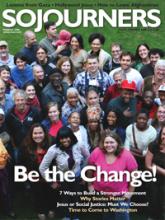His name was Richard, the same as mine. I sat inside his meager thatch hut, listening to his story, told through the tears of an orphan whose parents had died of AIDS. At 13, Richard was trying to raise his two younger brothers by himself in this small shack with no running water, electricity, or even beds to sleep in. There were no adults in their lives—no one to care for them, feed them, love them, or teach them how to become men. There was no one to hug them, either, or to tuck them in at night. Other than his siblings, Richard was alone, as no child should be. I try to picture my own children abandoned in this kind of deprivation, fending for themselves without parents to protect them, and I cannot.
I didn’t want to be there. I wasn’t supposed to be there, so far out of my comfort zone—not in that place where orphaned children live by themselves in their agony. There, poverty, disease, and squalor had eyes and faces that stared back, and I had to see and smell and touch the pain of the poor. That particular district, Rakai, is known to be ground zero for the Ugandan AIDS pandemic. There the deadly virus has stalked its victims in the dark for decades. Sweat trickled down my face as I sat awkwardly with Richard and his brothers while a film crew captured every tear—mine and theirs.
I much preferred living in my bubble, the one that, until that moment, had safely contained my life, family, and career. It kept difficult things like this out, insulating me from anything too raw or upsetting. When such things intruded, as they rarely did, a channel could be changed, a newspaper page turned, or a check written to keep the poor at a safe distance. But not in Rakai. There “such things” had faces and names—even my name, Richard.
Read the Full Article
